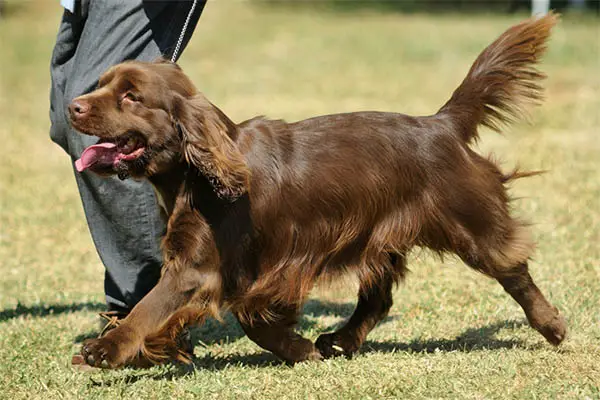Sussex Spaniel Dogs are medium-sized dogs that only stand at a height of 15 inches. They are long and low-built but are heavy-boned. Their bodies are covered with their medium-length, feathery coats that come in rich golden-liver colors.
Sussex Spaniel Dogs are built for strength and endurance, and they will be great companions for hunters and those who love going outdoors. They thrive for companionship and should not be left alone for hours.
These dogs love forming bonds, whether it’s with people or other pets in the house. They are dogs that should be kept inside your homes, so don’t get one if you wish them to stay in the backyard.

Sussex Spaniel Dog Statistics
| Dog Breed Group | Sporting |
| Breed Size | Medium |
| Height | 13-15 inches |
| Weight | 35-45 pounds |
| Lifespan | 13-15 years |
Sussex Spaniel Dog Breed Ratings
| Energy level | |
| Exercise needs | |
| Requires attention | |
| Playfulness | |
| Trainability | |
| Shedding | |
| Grooming | |
| Friendly with family | |
| Friendly with kids | |
| Friendly with strangers | |
| Friendly with other dogs | |
| Prey Drive |
Sussex Spaniel Dog History
Sussex Spaniel Dogs originated from England around the 1700s. They were developed in the estate of Rosehill Park located in Sussex, hence the name.
Two men, Woolland and Newington, created a breed made to hunt in heavy clay soil, dense undergrowth, and thick hedgerows. Thus, the Sussex Spaniel dogs have short legs and a burly torso.
It was between the years 1882 to 1887 when the first breed standard was written. Sussex Spaniel Dogs are slowly gaining popularity, but due to Woolland’s death, Newington struggled to keep the dogs from being forgotten completely.
By 1909, a man by the name J.E. Kerr produced his own litters of the breed, increasing the number of the Sussex Spaniel Dogs. Unfortunately, when the two World Wars broke off, the dogs’ numbers and popularity declined, and they almost suffered extinction.
Fortunately, Joy Freer spent 60 years of breeding and perfecting the breed. By 1969, the importation of the Sussex Spaniels to the US started again. By the year 1884, they were among the first dog breeds registered by the American Kennel Club.
Sadly, despite being one of the first breeds registered, Sussex Spaniel Dogs are considered rare and endangered. They currently rank 180th as the most popular dog in the US.

Temperament
Sussex Spaniel Dogs are friendly and merry dogs despite that growing expression. Indoors, they are even-tempered and calm compared to other spaniels. However, they can also be clownish if given the opportunity.
These dogs are usually content indoors, but they love the outdoors too. These dogs are built for endurance, so taking them out for long walks and hikes is necessary. If you’re a hunter, they’re perfect companions especially with their keen sense of smell and impressive tracking skills.
The Sussex Spaniel dogs are affectionate and loving to family. They love being around people and must be included in family activities. They are not the type of dogs that you can leave alone for hours as this will trigger separation anxiety.
If you’re worried about your kids, then you should rest easy as these dogs are gentle with children. They are great playmates if you have other pets in the house, too.
There are times that they’ll be aloof to strangers during the first meeting with their protective instincts kicking in. However, a short introduction will let him calm down, and they immediately become polite.
This is why it’s essential to socialize dogs at an early stage, so they become more well-rounded. Shyness would also be the least of your problems, as this helps them become more confident.
Training may be quite difficult for inexperienced owners. You must be confident and firm if you want to make them follow you. These dogs are stubborn and proud, so being harsh won’t work. Instead, shower them with more positive reinforcements.
Care Requirements
- Nutrition: Sussex Spaniel Dogs don’t have special dietary requirements. All that you need to do is provide them with high-quality and well-balanced meals daily. You also need to watch out for the number of calories you feed them every day to prevent them from getting overweight. Proteins, carbohydrates, and fats are essential nutrients for growing dogs. So, if you’re planning to prepare home-cooked meals, make sure to buy high-quality ingredients that only contain these nutrients. Adding fruits and vegetables to your dog’s diet is also a great idea. For commercially manufactured food, choose the premium quality ones. Always check the label to ensure no harmful ingredients, especially ingredients that your dog is allergic to, is included. Our safest recommendation in terms of your dog’s diet is to consult your vet. He’ll be able to come up with the best diet specific to your dog’s needs.
- Grooming: Sussex Spaniel Dogs have medium-length, feathery coats that shed seasonally. There’s not much that you need to do to maintain it other than giving your dog baths and brushing their coats. Brushing should be done 2-3 times a week and probably daily if it’s the shedding season. This will help remove dirt stuck on your dog’s coat and keep shedding to a minimum. At the same time, brushing prevents mats and tangles from forming. Trimming should be done on the hair at the bottoms of the feet to keep your dog from slipping. Shaving is never a good idea if you want to retain your dog’s natural look. Baths can be given occasionally only when your dog needs it. However, ears should be checked and cleaned regularly, and the nails should be trimmed once every two weeks.
- Exercise: Sussex Spaniel Dogs don’t need a lot of exercise until he turns one year, as this may only cause some damages to their joints. But as soon as they get to enjoy exercises, strenuous activities are not encouraged. Long walks, swimming, and hiking are the best exercises these dogs would enjoy. You can also let him play on his own in a securely fenced yard. They can also do agility work, but this should start only when your dog turns 18 months.
- Health: Sussex Spaniel Dogs are generally healthy dogs that can live long if taken care of properly. But sometimes, no matter how careful we are, there are cases when they are susceptible to certain conditions. For these dogs, pulmonic stenosis, patent ductus arteriosis, intervertebral disc diseases, and hip dysplasia are very common. Screening tests can be done to detect certain conditions at an early stage, so it’s advisable to have your dog take one. As for hereditary diseases, we recommend meeting at least one of your dog’s parents to be aware of any possibilities your dog might acquire a particular disease. You should also closely monitor your dog’s behavior, and if you notice any changes, take him to the vet.
- Lifespan: The life expectancy of Sussex Spaniel Dogs is 13-15 years.
Famous Sussex Spaniel Dogs
- Stump: The Sussex Spaniel Best in Show in Westminster’s 2009 dog show
Fun Facts about Sussex Spaniel Dogs
- Sussex Spaniel Dogs originated from England around the 1700s.
- They were named after Sussex County, where they were developed specifically.
- They were developed as hunting dogs.
- These dogs almost went extinct after the two world wars.
- They are rare and endangered dogs.
- They were among the first registered dog breeds by the American Kennel Club in 1884.
Check Out Other Sporting Dog Breeds:
American Water Spaniel, Boykin Spaniel, Brittany, Chesapeake Bay Retriever, Clumber Spaniel, Cocker Spaniel, Curly-Coated Retriever, English Cocker Spaniel, English Setter, English Springer Spaniel, Field Spaniel, Flat-Coated Retriever, German Shorthaired Pointer, German Wirehaired Pointer, Golden Retriever, Gordon Setter, Irish Red and White Setter, Irish Setter, Irish Water Spaniel, Kooikerhondje, Labrador Retriever, Lagotti Romagnoli, Nova Scotia Duck Tolling Retriever, Pointer, Spinoni Italiani, Vizsla, Weimaraner, Welsh Springer Spaniel, Wirehaired Pointing Griffon, Wirehaired Vizslas
